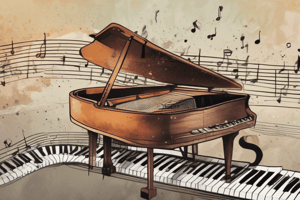Podcast
Questions and Answers
What is the primary function of chord progressions in piano improvisation?
What is the primary function of chord progressions in piano improvisation?
- Analyze music and create compositions
- Emphasize the pattern of notes in a composition
- Develop finger strength and melodic ideas
- Provide a framework for improvisation (correct)
Which fundamental concept of music theory deals with the distance between two notes?
Which fundamental concept of music theory deals with the distance between two notes?
- Chords
- Intervals (correct)
- Scales
- Rhythms
What skill allows musicians to create music spontaneously without a pre-written score?
What skill allows musicians to create music spontaneously without a pre-written score?
- Analyzing music
- Improvisation (correct)
- Playing scales and arpeggios
- Developing motifs and patterns
Which musical element emphasizes the pattern of notes in a composition?
Which musical element emphasizes the pattern of notes in a composition?
What is an essential skill in jazz harmony that unlocks a new world of possibilities?
What is an essential skill in jazz harmony that unlocks a new world of possibilities?
Which technique involves replacing chords with more dissonant and interesting alternatives?
Which technique involves replacing chords with more dissonant and interesting alternatives?
What aspect of melody creation involves studying the shape of a melody, including climbs, falls, and turns?
What aspect of melody creation involves studying the shape of a melody, including climbs, falls, and turns?
What does reharmonization involve in music?
What does reharmonization involve in music?
Study Notes
Unleash Your Inner Music Maven: Exploring Music Theory, Piano Improvisation, Jazz Harmony, and Melody Creation
In the quest for musical enlightenment, let's embark on a journey through the vibrant world of music, focusing on the subtopics of music theory, piano improvisation, jazz harmony, and melody creation.
Music Theory 101
Music theory is the foundation upon which all musicians build their skills. It's the language of music, and understanding it empowers you to communicate with other musicians, analyze music, and create your own compositions. Some fundamental concepts include:
- Scales: A series of notes within a specific pitch range.
- Intervals: The distance between two notes.
- Chords: Groups of notes played simultaneously.
- Rhythms: The pattern of notes in a composition, emphasizing how long and short notes are.
Piano Improvisation
Improvisation is the art of creating music spontaneously, without a pre-written score. This highly creative skill allows you to express your musical ideas in real-time, drawing from your knowledge of theory, chord progressions, and melodic structures.
- Chord progressions: A sequence of chords that form the backbone of a piece, providing a framework for improvisation.
- Scales and arpeggios: Practice playing scales and arpeggios in various keys to build finger strength and develop melodic ideas.
- Motifs and patterns: Learn to identify recurring motifs and patterns in music, and develop your own.
Jazz Harmony
Jazz is renowned for its rich harmonies, often built on chord progressions and scales that are more advanced than those found in other genres.
- Harmonic minor scale and bebop scales: Understanding these scales unlocks an entire world of jazz harmony.
- Chord substitutions: Learn to replace chords with more interesting and dissonant alternatives.
- Reharmonization: The art of taking a chord progression and rearranging the chords to create new textures and melodies.
Melody Creation
An effective melody is the heart of any beautiful piece of music.
- Melodic contour: A melody's shape, including its climbs, falls, and turns.
- Motif development: Learn to develop simple melodic motifs into rich, elaborate melodies.
- Melodic shapes: Study various melodic shapes, such as arches, waves, and spirals, to broaden your melodic vocabulary.
By mastering these elements, you'll acquire the tools needed to craft your own unique musical creations. So, grab your instrument and get ready for an unforgettable journey through the world of music, where your imagination is the only limit.
Studying That Suits You
Use AI to generate personalized quizzes and flashcards to suit your learning preferences.
Description
Embark on a musical journey exploring music theory, piano improvisation, jazz harmony, and melody creation. Learn about scales, intervals, chords, chord progressions, harmonic minor scale, melodic contour, motif development, and more to enhance your musical skills.




